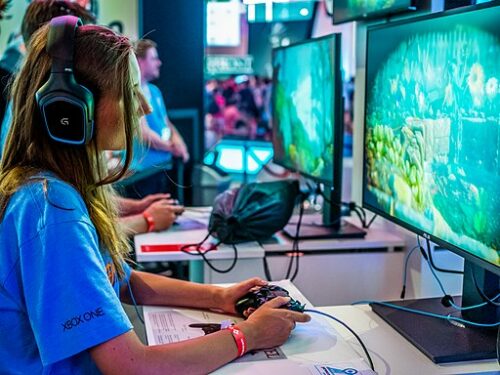Image courtesy of Flickr
In the twenty-first century, it is nearly impossible to see adolescents not engaged in some kind of digital media. Video games are among the most popular digital pastimes, and parents are concerned. Parents often worry about excessive screen time, potential addiction, and the impact of playing video games on academics, physical activity, and social interactions. They may also be concerned about the content of some games, including violence and inappropriate themes. Nothing good can ever come out of spending more time in-game, right?
Wrong. Lynn Fiellin MD ’96, formerly a head of the play2PREVENT Lab at Yale and now a professor of biomedical data science at Dartmouth, is making strides to bring more relevant topics into video games such as healthcare promotion and risk prevention. Playtest! is a video game designed to help increase HIV testing rates among adolescents. Despite making up nearly twenty percent of new HIV infection cases in the US in 2020, only nine percent of US high schoolers are ever tested for HIV. Fiellin sought to establish a relevant link to these adolescents to improve HIV awareness amongst the age group.
In the study, 287 Connecticut adolescents between fourteen and eighteen years old were randomly assigned to play Playtest! or a set of control games. Each participant was assigned to play for one session—typically lasting an hour—for four to six weeks, aiming for six hours of gameplay. Immediately following gameplay, and then at three months and six months after the first session, these adolescents were evaluated on their attitudes around HIV testing and counseling (HTC), with intentions, knowledge, self-efficacy, and behaviors as other measured outcomes. The results were astonishing: those adolescents who were in the Playtest! group saw improvements across the board, results that were essentially absent in the control group. “Our games focus on teaching teens accurate knowledge and important skills to make better decisions so that they can lead happier and healthier lives,” Fiellin said.
Fiellin’s work soared in relevance during the COVID-19 pandemic, when adolescents essentially moved their entire lives online. Seeing the increased demand for their video games, Fiellin established Playbl, a sister organization spun out of the lab in order to commercially distribute their video games. Through this commercial organization, community institutions such as schools and support groups gained more streamlined access to these games.
“play2PREVENT have demonstrated a strong impact on a number of outcomes in teen health and, as such, have the data behind them to show they are an important resource for all teens,” Fiellin said. And that impact extends beyond the video game on HIV awareness; Playbl offers four other video game interventions on current healthcare issues, including ones for mental health, opioid misuse, smoking/vaping prevention, and reframing negative thoughts. The play2PREVENT Lab hopes to shed new light on a traditionalist’s view on video games, demonstrating that in the digital age, gaming may not be so bad after all.

